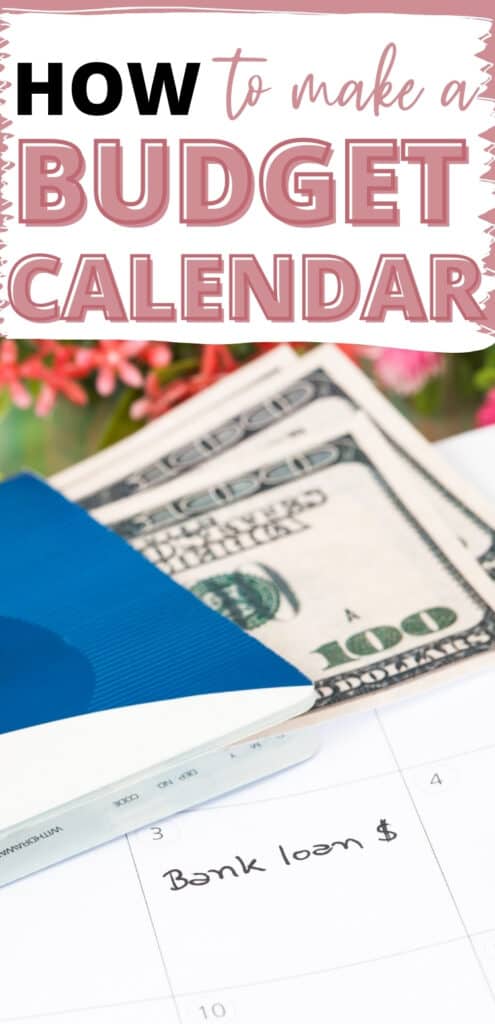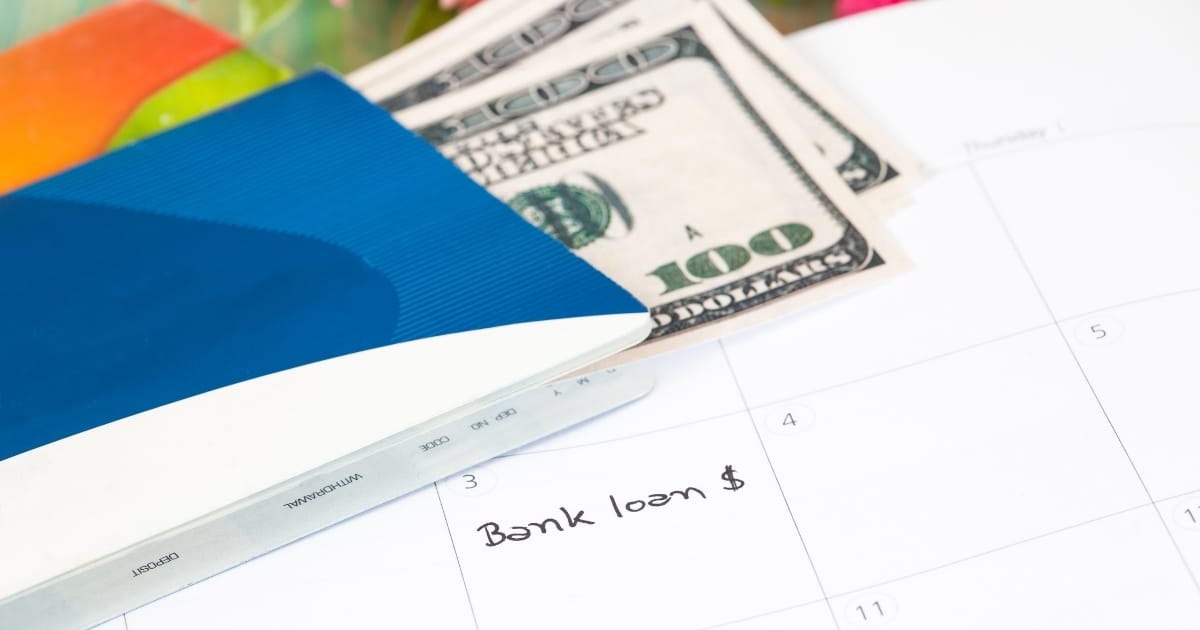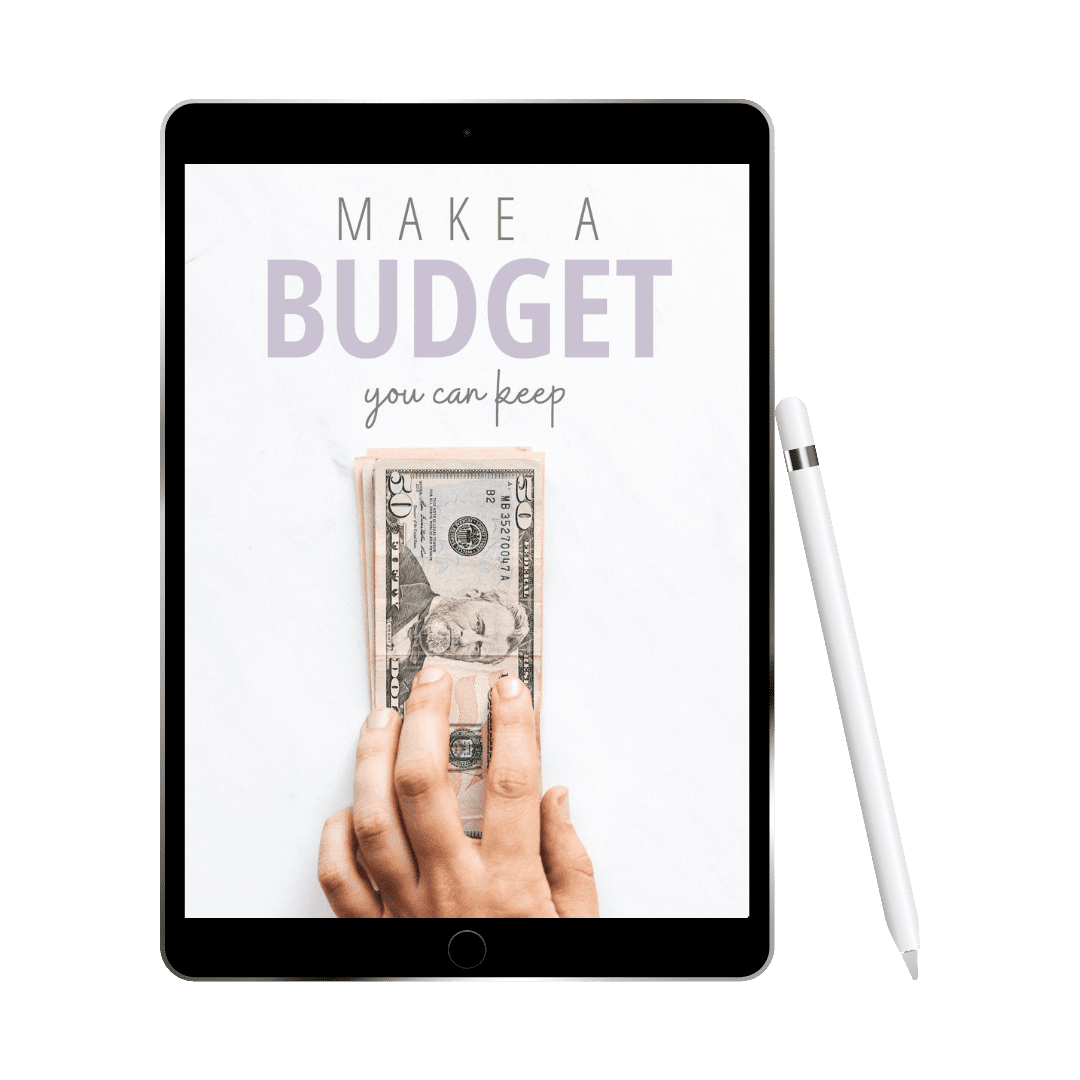How to Use a Budget Calendar to Gain Control of Your Money
This post may contain affiliate links. As an Amazon Associate, I earn from qualifying purchases. Please read my disclosure policy for more info.
Most of us use a monthly calendar to keep track of the important dates and events in our lives, but have you ever thought to transfer your budget onto your calendar?
I’m sure you know you should have a personal budget, but how often have you tried only to give up in frustration when the money runs out before you can cover all your expenses?
The traditional monthly budget process doesn’t work when you’re living paycheck to paycheck.
A budget calendar will help you manage your cash flow, track your bill due dates, and save for your financial goals all in a familiar setting.
Stress less & save more!
This FREE budget guide will help you create a budget that works for you!
What Is a Budget Calendar?

As the name implies a budget calendar is simply a calendar you use to manage your budget.
It’s a way of integrating your budget into your life that’s more intuitive.
Just as you track your activities in a calendar, you can track your income and expenses.
The primary things you’ll add to your budget calendar are your paydays, your bill due dates, and any automated savings withdrawals.
This will give you clarity into your financial situation at a glance.
You may or may not want to track all of your outflows on your calendar.
The Benefits of a Budget Calendar
There are several benefits to using a calendar to budget your money.
Improve Cash Flow
A calendar gives you a good overall look at your obligations and expected paydays so you can better manage your cash flow.
Traditional budgets may give you a feeling that certain expenses are coming up but there’s a disconnect that makes it all too easy to spend without awareness.
With a calendar budget, you can easily see that splurging on dinner and a movie today will affect your ability to pay the bill coming due in 2 days.
Keep on Top of Your Bills
Another key benefit of a budget calendar is the ability to see your bills and paydays at a glance.
This means you’ll always know when something is due and can be sure to pay it in time.
The calendar budget helps to guarantee you have the funds available when the credit card or other bill needs to get paid.
Start Building Your Savings
Having a clear picture of your inflows and outflows makes it easier to save money.
You’ll be more confident setting aside money knowing you’ll have enough to cover the bills coming due before you get paid again.
Calendar budgeting is a great way to start building your sinking funds and emergency fund.
How to Make a Budget Calendar
One of the best parts of using a budget calendar is how easy they are to make. All you need is a blank calendar to start.
Tools
When it comes to making a budget calendar you’ve got a few options in terms of your format.
You can DIY it with either paper or digital calendars or you can use an app designed specifically for calendar budgeting.
Paper
If you’re a pen and paper kind of person, you can just grab whatever calendar or planner you have laying around.
Or if you prefer a budget calendar with more advanced options (like a spending tracker and bill organizer) you can find a monthly budget calendar printable PDF in my free Budget Guide.
Digital
You may already have your work and personal life scheduled out in Google Calendar or some other online calendar. If that’s the case, you can also use it for your budget.
You may want to create a separate “calendar” for just the budget so you can turn it on and off if your days get too crowded.
Apps
There are also some apps that offer calendar budgeting. If you’d like to try out a dedicated app here are some to look into:
As much as I love new technology and playing with apps, be careful if you go this route. If you’re not diligent about checking into the app regularly, it defeats the whole purpose.
I’ve found it easier to adopt a new habit by tying it into something I already do.
If you’re constantly checking your calendar app or you use a physical planner to manage your life, those might be better places to build your budget so you remember to actually use it.
Putting a Budget Calendar Together
The reason a budget calendar works so well is that it’s so
Things to Track in Your Budget Calendar
Your calendar budget doesn’t have to be complex.
At a minimum, you just need to make a note of your income and your monthly expenses.
You can also track any automated savings that are coming out of your bank account.
Income
Whether you get paid weekly, bi-weekly, twice a month, or once a month, you’ll want to add your payday(s) to your calendar and make a note of how much you expect to be paid.
My favorite aspect of a budget calendar is how easy it makes paycheck budgeting.
We get paid every 2 weeks so our second pay period usually crosses over into the next month.
Using a traditional budget to forecast our month would always leave us short as we started the next month. Sure we stayed on budget toward the end of last month, but then we wouldn’t have money budgeted for the start of this month.
With calendar budgeting, you can turn the page or swipe over a month to see which bills will need to come out of which paychecks.
Bills
In order to see which bills need to be paid with which paycheck, you’ll need to add their due dates and amounts to your calendar.
Make sure you’re including all your fixed expenses, as well as any irregular bills like insurance or vehicle registration. Here are some common bills you’ll want to make sure you add:
- credit cards
- subscriptions
- utilities
- debt payments
- student loan payments
- rent/mortgage
- memberships
This can be eye-opening when you first do it.
The first time I added our monthly bills to a calendar I noticed the majority of them fell in the first 2 weeks of the month.
If you’ve got a solid buffer built up and are living on next month’s income, this might not matter, but when you’re living paycheck to paycheck, having all your bills come out of one paycheck is stressful, if not impossible.
By seeing when your bills are due in relation to each other, you can call the companies and try to have them spread out a bit more evenly.
Spreading your bills out will let you more easily manage other expenses like groceries and gas, and may also help you put a little extra money toward savings each pay period.
Automated Savings
I’m a big fan of paying yourself first so I highly recommend you automate some savings if you aren’t already.
You’ll have much more success saving for your money goals if you pull that money out before you spend than if you wait and try to save what may be left over after you’re done spending.
Once you set up your savings automations, make sure you add them to your calendar so you have a full picture of your finances.
Also, it’s worth making a note of your method of payment (mailed-in, in-person, online) and when to send payment or if it’s set to auto-pay.
Color Coding Your Calendar
If you want to take your budget calendar to the next level, try color-coding it!
Make a key with your budget categories and highlight each expense accordingly. This will help you see how your expenses align with your financial goals and values.
For example, if you’re highlighting all your entertainment subscriptions (Netflix,
Do You Need a Budget Calendar?
If you’ve ever stressed out over paying your bills or were frustrated by your lack of savings, a budget calendar will definitely help.
Here are some reasons why you need a budget calendar:
Fewer Missed Bills
With the amount of junk mail and email we get nowadays, it’s all too easy for bills to get lost in the mix.
Not only can missing a bill land you with late fees, but it might also have negative impacts on your credit report. According to FICO’s credit damage data sheet, one missed bill could drop your credit score by as much as 180 points!
If you’ve got your bills scheduled in your calendar, you’ll know right away if you’ve misplaced your statement. Then you can search your email or check your online accounts to make sure it gets paid on time.
Understand Your Cash Flow
Being able to see your expenses and your income at a glance makes it much easier to understand your cash flow.
When I discovered all our bills came due around the same time, it made it much clearer why we always seemed stretched at the beginning of the month.
Seeing everything plotted out on the calendar helped us finally take control of our finances.
Reduce Impulse Buying
I’m no stranger to impulse buying. From fast food to the latest gadget, I’ve always had a weakness for impulse buys.
But now that I can quickly see our income and expenses, I understand how those purchases can throw off our whole system and derail any progress we’re making toward our financial goals.
It’s not foolproof (I still indulge occasionally), but my impulsive spending habit has largely been eliminated, replaced with more informed and deliberate choices.
Encourages Saving
Another impact of calendar budgeting is the ability to save more.
Instead of stressing out over not having enough money to budget the entire month, you’ll find you may actually have some “leftover” money to budget. (If you don’t, it may be time to cut your expenses.)
Since your paychecks don’t have to stretch as far, you’ll have more money to put toward savings goals.
Don’t worry about bills due later in the month. Instead, build up your emergency savings and sinking funds as well as any other savings goals you have.
How To Make It Work/Maintaining Your Budget Calendar
The trick to making a budget that works is to make sure you’re actually using it.
You’ll want to check in with your budget frequently to make sure you’re not overspending.
And just like with any other budget, you need to be ready and willing to adjust as needed.
Calendar budgeting is great for helping you take control and break out of the paycheck to paycheck cycle, but it does have some limitations.
While it makes it easier to find money to add to savings, it might get cluttered if you try to track your savings there.
Using a calendar will help you keep track of expenses that might have thrown you before, like car insurance or your property tax.
But larger, irregular expenses like those should be saved for gradually, month to month, to avoid stressing out or wiping out an entire paycheck.
Try using a budget calendar alongside a sinking funds tracker in order to make things easier and more manageable.
Final Thoughts
Calendar budgeting has been life-changing for me and it can be for you too.
This one tool can transform your personal finances to help you pay off debt, build your savings, and finally feel in control of your finances.
If you’ve been struggling with budgeting, stressing about paying your bills, or frustrated with your savings, a budget calendar may be the answer you’ve been looking for.
Want to work together?
I would love to help you gain clarity and confidence with your money! If you’re ready to stress less, save more, and enjoy your money, click below to learn more about financial coaching.











